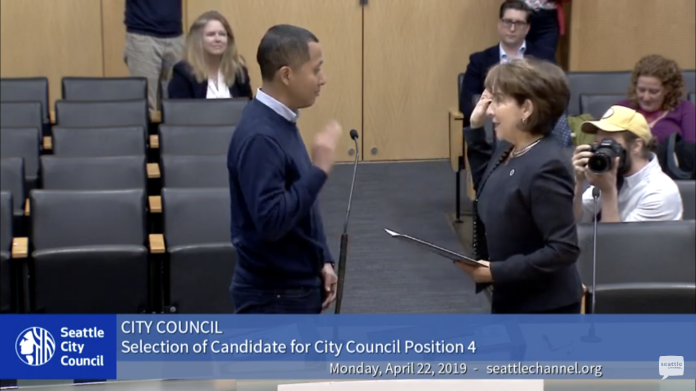On Monday, the Seattle City Council approved several significant pieces of legislation and welcomed a new temporary member to the body. Council adopted a library levy renewal plans and an action plan for North Delridge community in addition to adjustments to the vacant buildings monitoring program, an interlocal agreement with King County to speed up reimbursement funding under the Conservation Futures program. An implementation and evaluation plan was also approved for the recently reauthorized 2018 Families, Education, Preschool, and Promise Levy.
Library levy renewal

In August, Seattle voters will get a chance to weigh in on renewal of the Seattle Public Library levy. The six-year property tax levy would initially start at $0.122 per $1,000 of assessed value, which is intended to raise $219 million (about $36 million per year). The levy will help the library system maintain existing services and even increase them. Library hours will be expanded at all libraries with an emphasis on Sundays throughout the system as well as Monday through Thursday evenings, except for the Central Library. The levy would also help fund other key programs and aspects of operations:
- $2.1 million would be a set aside for the Play and Learn program, which would be targeted at children five and younger;
- Overdue fines would be fully eliminated;
- Funding would allow for continued improvement and expansion of the library collections and technology; and
- Building maintenance and rehabilitation would continue throughout the system.
North Delridge action plan
The Office of Planning and Community Development has worked to create an action plan to improve the North Delridge community. The action plan looked at wide ranging issues and identified new policies that should be added to the city comprehensive plan for future implementation. Generally speaking, these issues focused on parks and recreation, arts and culture, and mobility. The action plan, however, does acknowledge that future station area planning will be needed in the future.


Comprehensive plan amendments include some of the following:
- “D-P8 Work with communities to add programming or improvements that are appropriate for the character of each park to increase overall use and opportunities for physical activity.”
- “D-P9 Support the Delridge Community Center, the Southwest Teen Life Center, and organizations like Youngstown Cultural Arts Center in providing a range of culturally supportive programming.”
- “D-P22 Undertake Sound Transit 3 station and station area planning and design to support community-oriented commercial development, additional residential development, and improved access by biking, walking, and taking transit. A station access plan should also enable car drop-off at the station given the challenges to accessing the station by foot.D-P28 Increase the number of streets with sidewalks, implementing the Pedestrian Master Plan and community priorities for new sidewalks.”
- “D-P31 Partner with organizations such as Feet First, school-based programs, and the community center to offer culturally responsive programs that promote bicycling and walking.”
- “D-P47 Strive to increase opportunities to access affordable healthy food along Delridge Way SW near Brandon Junction or Sylvan Junction.”

Priority actions included in the plan include the following:
- “Economic Development: Engage businesses and residents to create a business support and economic development strategy.”
- “Delridge–Where Nature, Art and Culture Collide: Maximize the impact of community events like Delridge Day Festival, Art in Nature Festival, and DNDA’s Cultural Series to engage Delridge’s diverse communities and establish a strong identity for the community.”
- “Delridge Way SW RapidRide H Line Project: Create a multimodal corridor that provides safe transportation connections to community destinations for people of all ages and abilities, supports economic development, and improves the character of Delridge and the community destinations along it.”
- “Access to Affordable, Healthy Food: Support the Delridge Grocery Cooperative and other initiatives to establish a grocery store and other outlets that provide access to affordable, healthy food.”
- “Brandon Connector: Improve SW Brandon Street to connect Camp Long with the east side of Delridge Way, and eventually to Puget Ridge and South Seattle College.”
- “Green Stormwater Infrastructure: Implement natural drainage systems projects at key locations to improve drainage by installing roadside raingardens and sidewalks where there are none.”
The action plan is the culmination of a four-year planning process that kicked off in mid-2014 and involved dozens of partners and community organizations. Many ideas that were captured through that process have been identified for subareas within the action plan:
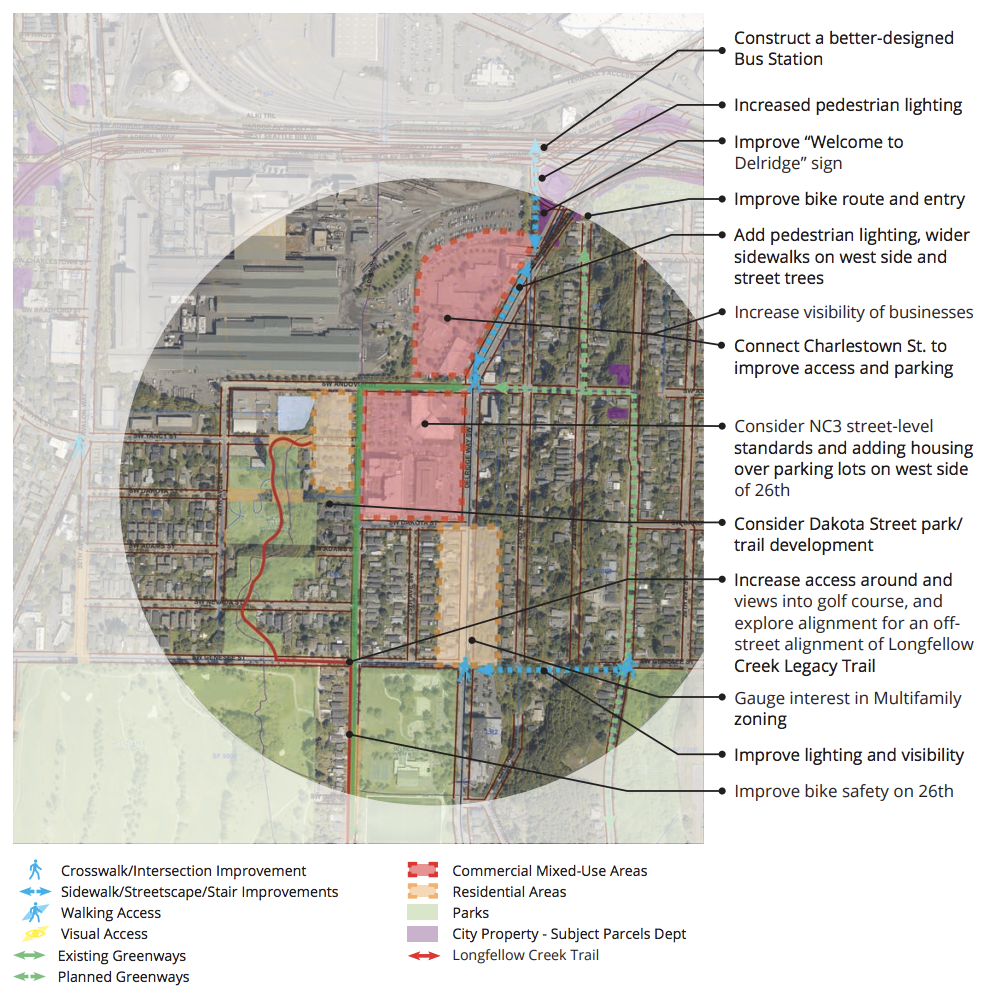
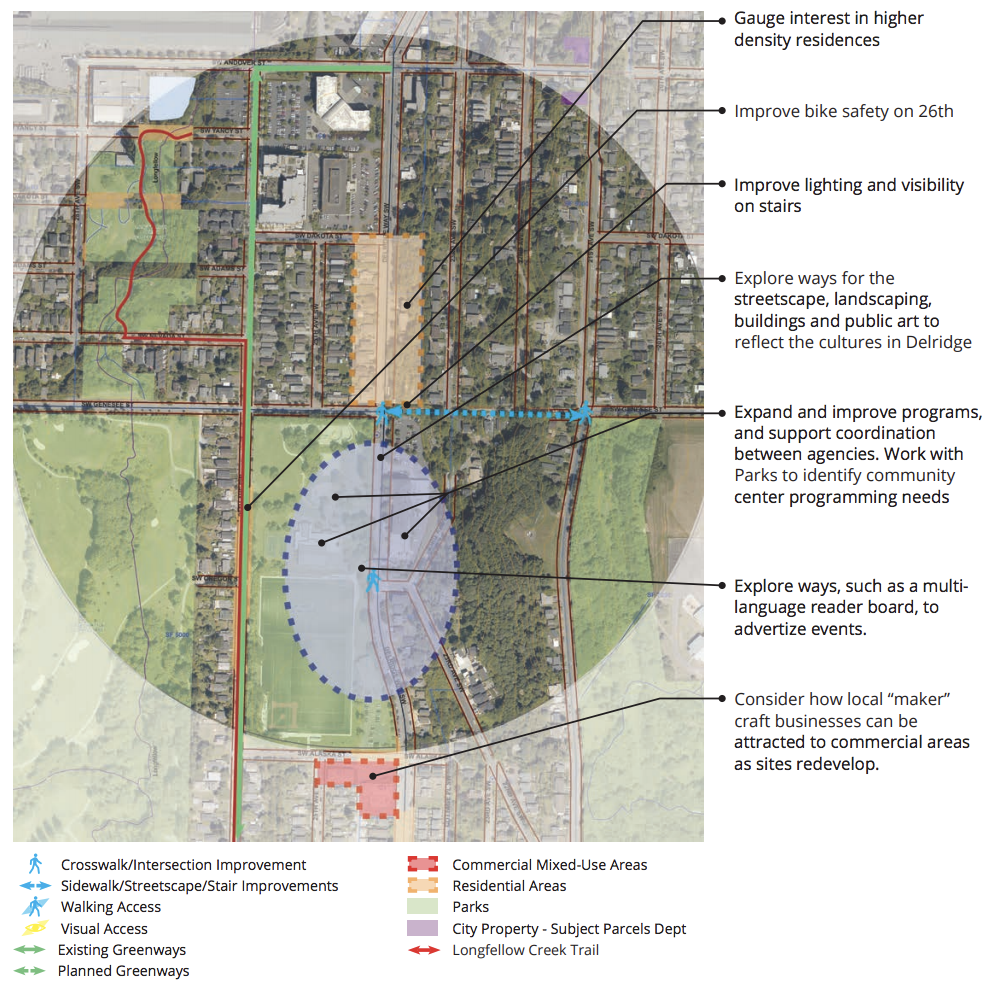
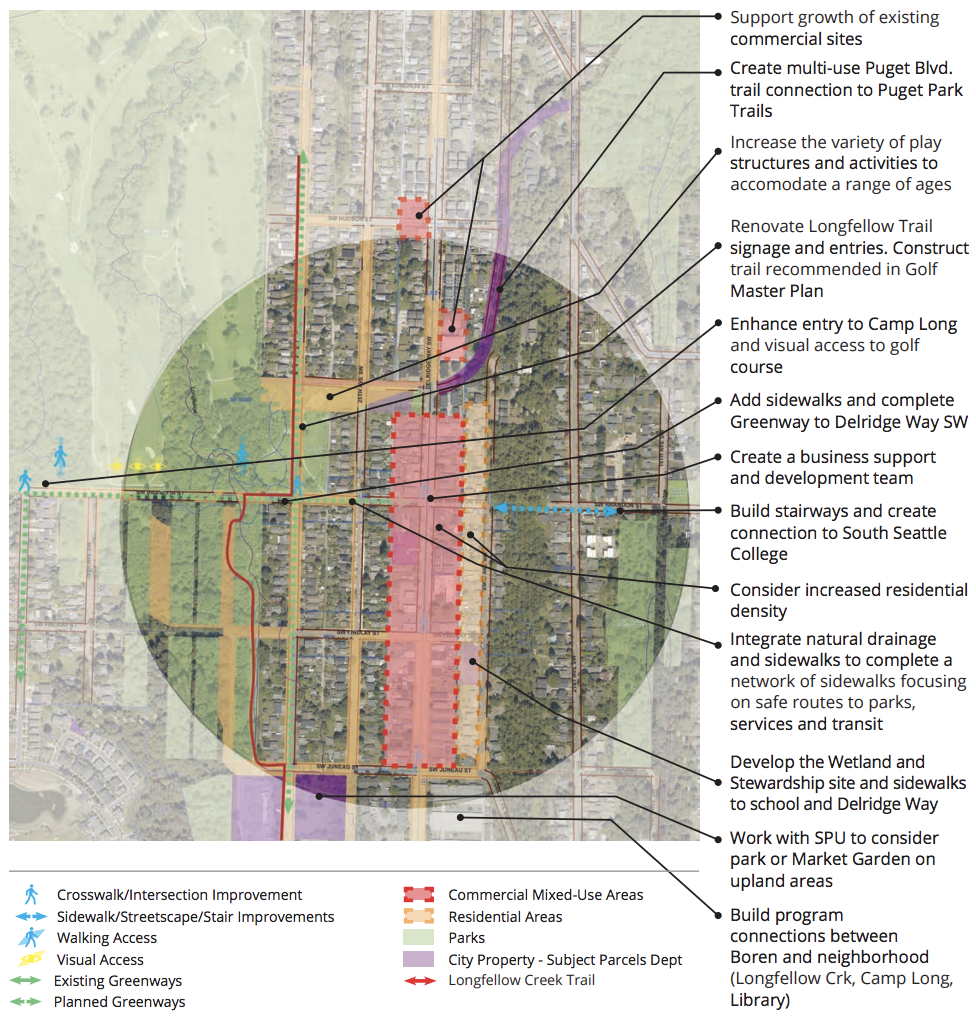
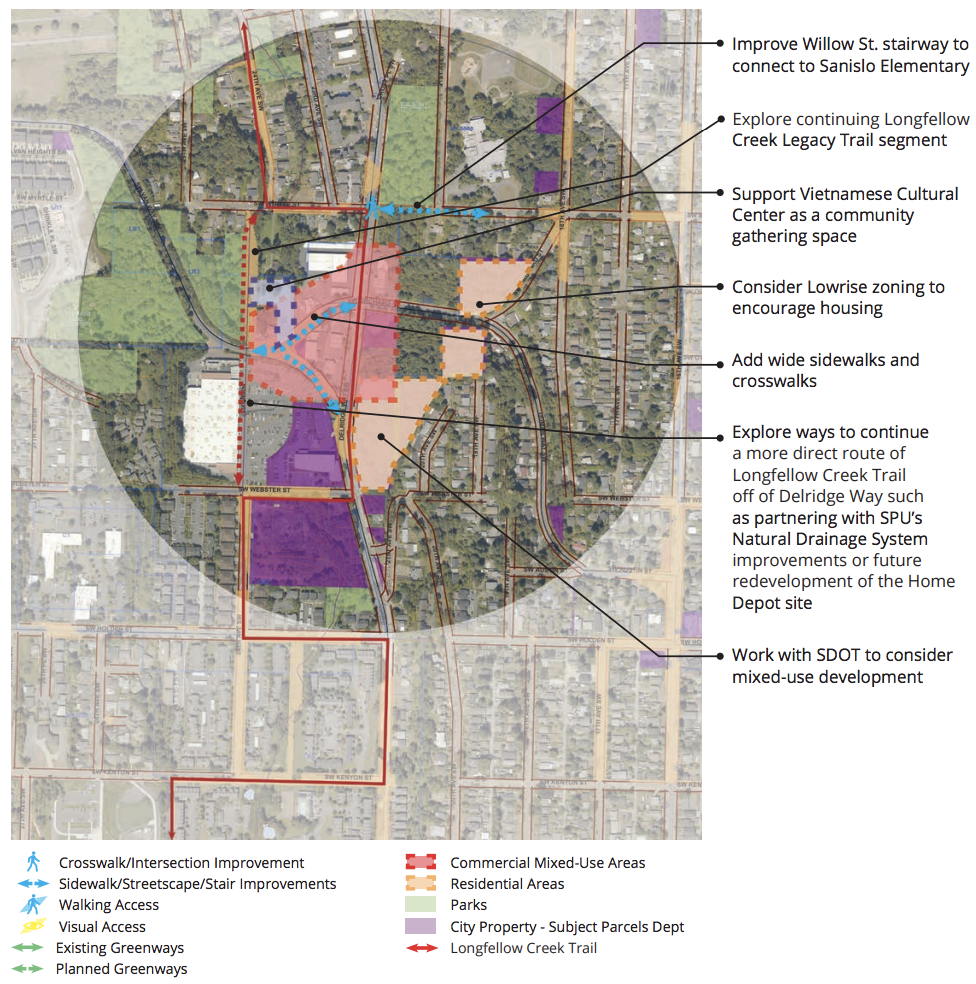
Under the comprehensive plan, implementation of the goals and policies should unfold over the next 20 years with some aspects coming to fruition much sooner like greenways, crossings, and RapidRide H Line.
Vacant buildings monitoring program
Several updates were made the city’s vacant buildings monitoring program, following a report on performance last fall. The program was last modified in September. The changes made by the city council on Monday are fairly narrow:
- Inspection fees for buildings in compliance of codes were modestly increased to fund the program costs;
- Vacant buildings will be enrolled in the monitoring program if only one violation has been made and not resolved in a timely fashion, or when a second violation has occurred within one year of the first even if the first had been resolved; and
- Vacant buildings could be removed from the monitoring program if there have been three consecutive inspections without any identified violations instead of four.
Conservation Futures interlocal agreement

The city council authorized a new Conservation Futures interlocal agreement with King County. The Conservation Futures program includes a countywide property tax that raises funding to protect a variety of valuable lands like farms, open space, forests, and other recreational areas. Revenue has been used to provide matching funds for property acquisition under various city parks and recreation programs. According to Seattle Parks and Recreation, the city has received about $63 million in grants from the Conservation Futures program, which has help with the acquisition of approximately 150 properties and 130 acres of land.
The new interlocal agreement builds upon the old one, but helps streamline the process to receive grants. The current process has several more back-and-forth steps that can stretch the timeline beyond two years. The new interlocal agreement should shave off a substantial amount of time so that it takes just over a year to receive grants–also saving staff time.
New councilmember for District 4
The city council selected a new member from the public to fill the position recently held by retired Councilmember Rob Johnson. Abel Pacheco, a resident in District 4, and former (and current) candidate for city council was picked to the finish out Johnson’s term after a round of voting. Five of the eight city councilmembers chose Pacheco, including Councilmembers Sally Bagshaw, Lisa Herbold, Teresa Mosqueda, Debora Juarez, and Bruce Harrell. David Goldberg and Brooke Brod each received one vote in the final tally.
At age 31, Pacheco will be the youngest member to the serve on the city council. He currently works as the Director of Strategic Engagement for Washington Mathematics, Engineering, Science Achievement, which is a STEM pathway program within the University of Washington for young women and students of color. In his run for city council, he lists housing affordability, multimodal transportation, increasing access to opportunity, and homelessness assistance as top priorities of his. Pacheco does not own a car, he said, because he wants to reduce his carbon footprint and prefers getting around without one. (You can read our previous interview from 2015 with him for past priorities and issues.)
Councilmember Pacheco will immediately begin his assignments on the city council and be responsible for chairing the Planning, Land Use, and Zoning Committee. While the Mandatory Housing Affordability program has come to its end, there are still major land use bills that are poised to come through the committee this year. He will hold the seat until the November General Election results for the seat’s replacement are certified.
Stephen is a professional urban planner in Puget Sound with a passion for sustainable, livable, and diverse cities. He is especially interested in how policies, regulations, and programs can promote positive outcomes for communities. With stints in great cities like Bellingham and Cork, Stephen currently lives in Seattle. He primarily covers land use and transportation issues and has been with The Urbanist since 2014.

